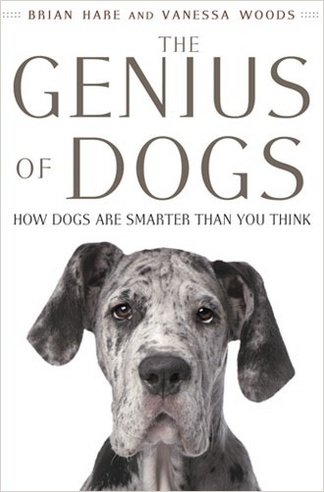'The Genius of Dogs' explores canine intelligence, challenges long-held theories of the domestication of wolves

I'm fascinated by the differences in our culture when it comes to sharing life with canines. The way we live with pets has certainly changed by leaps and bounds in recent decades, and it hasn't come without some complications, as most cultural changes often do.
But let's back up a bit.
Humans and dogs haven't always lived under one roof, and examining how that has come to fruition has been as interesting as the complexity of what we see go on in our homes today.
A new book, The Genius of Dogs, written by husband and wife team Dr. Brian Hare and Vanessa Woods, examines canine intelligence and dog's cognitive abilities, some of which are very different than other species.
One recently-published essay adapted from the book on the topic of how dogs became domesticated resonated with me.
There is some dissent regarding whether it was wolves or humans that initiated the first move when it came to forging a relationship and why that happened. In many respects, we can only hypothesize and guess, but I think that in looking at it from all angles we can better serve canines and ourselves in the future.
Hare, an evolutionary anthropologist and Woods, a research scientist — both with Duke University — note in the essay that, despite some popular assumptions about how the symbiotic relationship between these canids and humans began and then developed, there are other telling details that can explain much more.
Hare and Woods explain that while yes, the dogs that we share our lives with are descendants of wolves, they challenge the conventionally-held theories such as the one that wolves evolved into the pet dogs that we have today simply because we brought wolf pups into our dwellings and kept them. They also address the long-held idea that we forged a bond with wolves so that we could use them to help us hunt. I find the latter is especially interesting: why would wolves share food with any other living thing — humans or otherwise — besides those in their own established circle?
So what other explanation is there?
The essay asserts that wolves actually adopted us — an idea that I find more plausible than us making the first move toward co-existing with them, and of course our taking the credit for the union.
When you look at the way that things best survive and adapt, it certainly seems more likely that wolves recognized that they could attract more flies with honey than with vinegar, so to speak. Attracted to and scavenging through refuse dumps on the outer areas of human settlements, it probably didn't take long for the four-legged creatures to realize that those of their species who were friendly and unafraid to approach were more readily tolerated than those that were not.
The humans would have promptly killed aggressive wolves that tried to approach.
The "friendliness factor" set some other things into motion over time: physical changes that offer a more cute and affable appearance, like changes in their coat, ears and tails — characteristics that today's canines have.
Considering how we have so sourly treated wolves throughout history, I think the points that the co-authors present make a lot more sense than behaving as though we are solely responsible for the evolution of wolves into the dogs that we know and love today.
In any case, that shift that was so boldly made likely shaped the stability of the evolution of humans in many ways, as I've expanded upon before.
Lorrie Shaw leads the pets section for AnnArbor.com and owner of Professional Pet Sitting. Shoot her an email, contact her at 734-904-7279 or follow her adventures on Twitter.


Comments
bwp
Thu, Apr 4, 2013 : 1:02 a.m.
I love doggies!
Mousedeva
Wed, Apr 3, 2013 : 1:23 p.m.
I think it could be a little of all theories. Good timing since we are trying to educate the public on the wolf issue before the next election and with the senseless killing going on out west!
mgnfcntb
Tue, Apr 2, 2013 : 1:28 p.m.
I don't buy it. Humans killed wolf, found pups, pups bonded to humans, humans breed wolf to be less aggressive, make animals that can never fully mature. Humans!